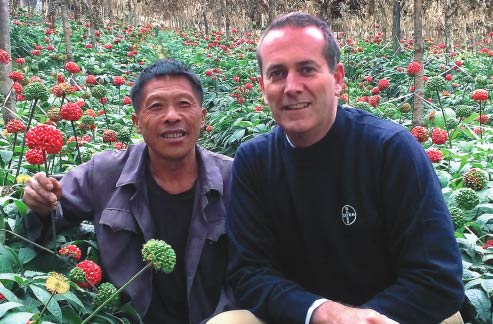 |
|
Rob Hulme, head of Bayer CropScience's China division, works with local governments to provide advice on sustainable farming methods. [Provided to China Daily] |
Bayer executive helps Chinese farmers use pesticides for targeted purposes
Rob Hulme can only dimly imagine his grandfather's farm life, reliving it by poring over his diary: "At 3 am, I released the 40 horses from the fence, then I fed them before I led them to pull the plough." The diary was written in the 1920s.
The 1,200-hectare farm that Hulme's family owns has passed down through five generations. But of course the days when horses were the busiest laborers in these sprawling fields in southeastern Australia have long since disappeared. They have given way to combine harvesters that spare man and beast the backbreaking work that took weeks, and that can harvest hundreds of hectares of wheat in just a few days.
Hulme himself has moved on, too. There is no doubt that the agricultural blood his forebears passed on to him still surges through his veins, but he is now happy enough to call himself "a former farmer" and is more likely to be seen sitting in a company boardroom wearing a neat suit than driving a farm tractor wearing a singlet.
Hulme, 48, is the country head of Bayer CropScience, China region, a role that takes him all over the country. One week he may be sitting in a cotton field in the Xinjiang Uygur autonomous region and the next in a rice field in the Guangxi Zhuang autonomous region, in both cases talking about this year's harvest or about the effects of pesticides.
The seeds of his relationship with China were planted nearly 50 years ago in Holbrook, in the state of New South Wales. With its 2,000 residents, Holbrook was what Australians call a town, but which Chinese would regard as a mere village. And like many towns all over Australia, it was endowed with a pub, a fish-and-chip shop and a Chinese restaurant. So from a young age, kung pao chicken, Sichuan beef and honey fried prawns became almost as natural to Hulme as the quintessential Australian school lunch, a Vegemite sandwich.
As is befitting for a man of the land, Hulme was born in the year of the horse, which, according to Chinese culture, was destined to make him passionate, independent and likely to leave his hometown at an early age. That is exactly what he did, leaving the farm as a small child, spending six years in a boarding school, and then going to the University of New England in the town of Armidale for five years to study rural science.
Hulme has three brothers, two of them older than him, who still work on the family farm. They grow wheat and canola on one half of it and let 4,000 sheep and lambs graze on the other half. So that nutrients in the soil can be replenished, the two halves are rotated once a year.
This practice has become so ingrained in Hulme that he has become a strong advocate of sustainable farming, especially minimum tillage. With this farming method tilling is avoided after harvesting in favor of spraying herbicides, and grass is allowed to degrade naturally. The aim is to keep nutrients in the soil, sustaining it for the use of many more generations.
That practice is problematic in China for geological reasons and because of the many methods that are used in tilling.
"This is also what I love about China-the huge diversity," says Hulme, wearing a bluechecked cotton shirt, and smiling broadly.
